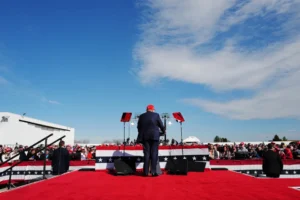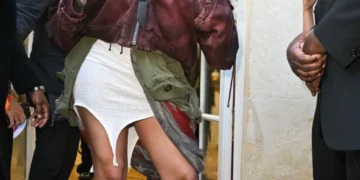
“If we fail to secure victory in this election, mark my words, there may not be another election in this nation,” Donald Trump ominously declared in a recent speech. This statement reflects Trump’s tendency towards projection, a recurring theme in his rhetoric. Addressing supporters in Ohio, Trump dehumanized certain migrants by categorizing them as “not people,” a tactic often utilized by autocratic leaders. He also referred to the January 6 insurrectionists as “hostages,” even saluting them, and made alarming remarks about imposing a staggering 100% tariff on Mexico-made Chinese cars amidst inflation concerns.
While Trump’s bleak portrayal of America’s future has been a consistent theme throughout his tenure, it’s crucial for the media to highlight the stark contrast between his rhetoric and that of past presidential candidates, including current President Joe Biden. Just days prior, Trump expressed admiration for Hungarian autocrat Viktor Orbán, praising him as unmatched in leadership and intelligence. Additionally, recent reports by CNN’s Jim Sciutto shed light on Trump’s admiration for authoritarian figures like North Korea’s Kim Jong Un, with allegations suggesting he once made favorable comments about Adolf Hitler’s actions.
It is imperative to remain vigilant in recognizing and scrutinizing Trump’s autocratic tendencies, as they diverge significantly from the principles and norms upheld by previous leaders and the current administration.
In 2016, the news media’s attention seemed disproportionately focused on Hillary Clinton’s emails rather than adequately conveying the potential consequences of a Trump presidency, all while projecting confidence in her victory. As we approach the upcoming election, it’s imperative that the media does not downplay the ramifications of a potential second Trump term and remains vigilant in highlighting not only a candidate diverging from democratic norms but also an entire political party doing so.
At present, Trump exerts significant influence within the Republican Party, having strategically positioned individuals like daughter-in-law Lara Trump as co-chair of the RNC and “MAGA Mike” Johnson as Speaker of the House. Johnson, a vocal proponent of election denial, was among the 139 House Republicans who sought to overturn the 2020 election results in favor of Trump, despite clear evidence of his defeat. Republicans who opposed Trump’s falsehoods, such as Liz Cheney, have faced repercussions, indicating that under Johnson’s leadership, the House effectively operates as an extension of the Trump campaign.
With 231 days remaining until the election, polls suggest a potential return to the White House for Trump is a distinct possibility. However, it’s essential to acknowledge the limitations of polling accuracy, as evidenced by their inaccuracies in previous elections. Politico reported that national and state polls in the 2020 presidential race were among the least accurate in recent history. Despite this, it’s evident that the 2024 election will likely be closely contested, possibly determined by narrow margins in key states.
Given the looming prospect of a Trump presidency, the media bears a responsibility to inform the public about the threats to democracy posed by his potential re-election and the significant governmental and global realignments that could result. However, this task is complicated by widespread news fatigue, evident in declining viewership of cable news networks and diminished public engagement with primary elections. Unlike in previous cycles, where Trump’s presence drove heightened interest in media coverage, the current landscape reflects a more subdued atmosphere.
Moreover, social media platforms have become increasingly lax in fact-checking Trump and his allies, with some platforms even owned by individuals who propagate anti-migrant rhetoric and election misinformation. Trump supporters have effectively pressured social media companies to downplay their efforts in labeling false information, all while attempting to portray President Biden as the one undermining democracy. As Professor Kate Starbird highlighted, those who benefit from spreading disinformation have successfully stifled dissenting voices, further complicating efforts to combat misinformation.
The New York Times has identified a resurgence of election disinformation circulating across social media platforms, bolstering Trump’s resurgence as he propagates falsehoods about the 2020 election. Despite overwhelming evidence to the contrary, 6 in 10 Republicans persist in believing that the previous election was stolen. This skepticism towards mainstream media has dramatically increased, with just 11% of Republicans expressing confidence in it, a significant decline from 52% in 1998.















































